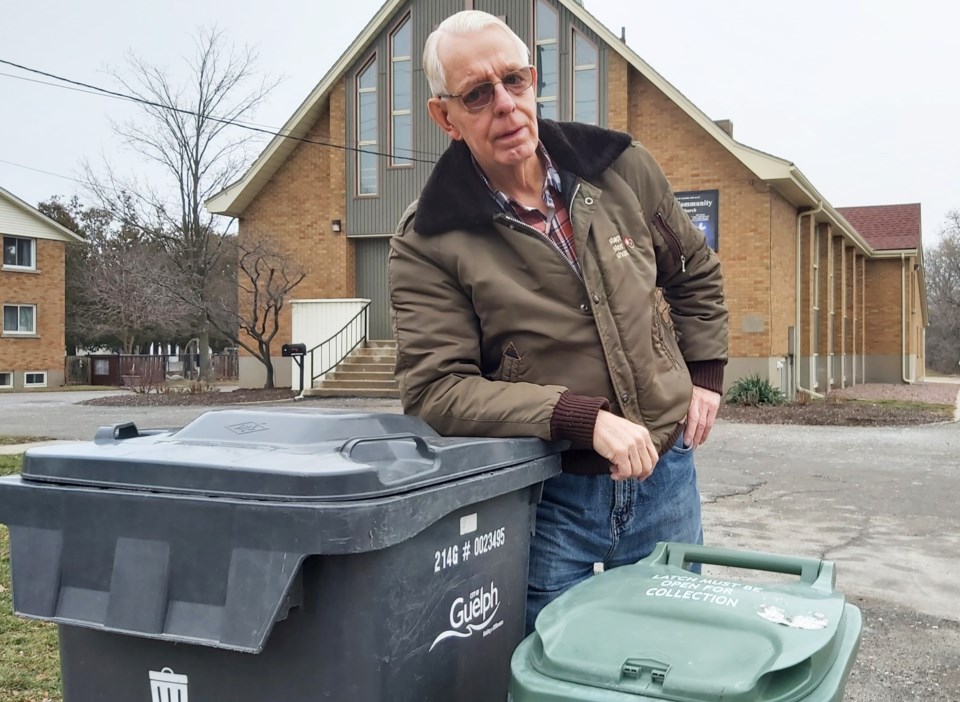Some local faith groups and small business owners are holding their nose in advance of city plans to stop collecting their waste … at least not without a signed contract and proof of liability insurance, which aren’t currently required in all cases.
City collections of non-contracted, non-residential services are set to end before the new rules come into place on March 1 – something that received council’s stamp of approval almost a year ago.
“Why is there a need for any of it?” questions Carl Visser, chair of the board at Riverside Community Reformed Church, who said he first received notice of the upcoming change earlier this month.
“They’re never coming onto my property,” he added, explaining the church puts its waste on the curb, which is city property, and someone brings the bins back in after the collection truck has been by. “I don’t see why the city needs my liability insurance.”
The church currently uses all three waste streams, with its bins kept in the basement and the appropriate ones delivered to the curb each week.
“It seems whoever drafted this ordinance may have forgotten that there are many small-footprint businesses that are neither legally in the downtown core, nor out in big box land,” Jesse Merrill of Polestar Hearth Baker wrote in a letter to council and circulated to GuelphToday.
“This new bylaw doesn’t make the slightest difference to big box stores who were never on municipal collection routes; it doesn’t affect the many businesses in strip malls with huge parking lots and plenty of room for dumpsters,” he continued. “But it will make a serious impact on many small businesses outside the core, in mixed-use neighbourhoods, with small footprints, no room for dumpsters, and no money in the budget for private collection.”
The change in service was approved by council last March as part of the solid waste master plan, which includes a ban on plastic bags and Styrofoam containers. A tweaked version of the plan was endorsed in September.
Both versions contained the service change for small businesses and institutionally zoned properties.
“In general, the provision of municipal waste collection services for (industrial, commercial and institutional) properties has not been considered a responsibility of Ontario municipalities, and service levels and collection practices vary widely amongst municipalities,” Terry Gayman, the city’s acting-general manager of environmental services, said in an email, explaining the update is intended to “ensure fair, equitable and consistent service levels.”
“Insurance is required whenever the city is contracted to provide a service, which is different than the general provision of municipal services, such as residential waste collection done in compliance with policies and bylaws,” he continued. “The amount of insurance required varies from contract to contract depending on the level of risk anticipated.”
In the case of Riverside Community Reformed Church, Visser said $5 million of liability insurance is needed, with the city listed as co-insured.
An administrator for First Baptist Church confirmed it currently uses city waste collection services – bins are put out along a lane behind the church, where several residences do too – and they were unaware of the upcoming change.
About 200 current city customers will be impacted.
“This is a new and unexpected expense no small business has planned for,” wrote Merrill. “Did anyone make any effort (beyond googling a few phone numbers of private waste collection services) to figure out how small businesses would deal with this? How many thousands of dollars will this cost me per year?”
Availability of space for waste bins or dumpsters is another issue of concern.
“Importantly, we have no room for dumpsters on our property,” Merrill added, noting the only place for a private contract dumpster to go is on top of the bakery’s six parking spaces required by zoning bylaw. “Will we lose our business license when a dumpster fills that spot? Who is going to explain to our neighbour in the house next door that there will now be a huge, smelly dumpster parked up against his fence?”
Given its space limitations, Merrill raises the issue of sorting waste material the different streams – garbage, recyclables and organics.
“We’ll no longer be able to sort our waste streams,” he wrote. “We don’t have room for one dumpster, let alone three.”
